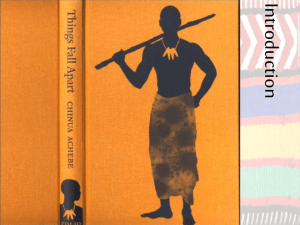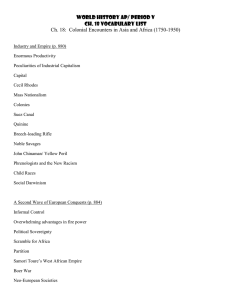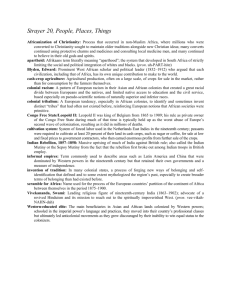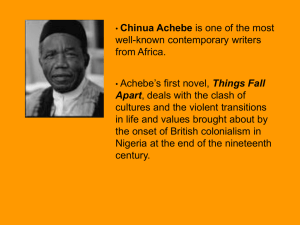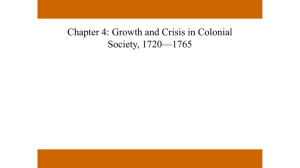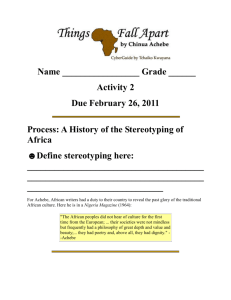POSTCOLONIAL EDUCATION THROUGH LITERATURE IN MEMORIAM:
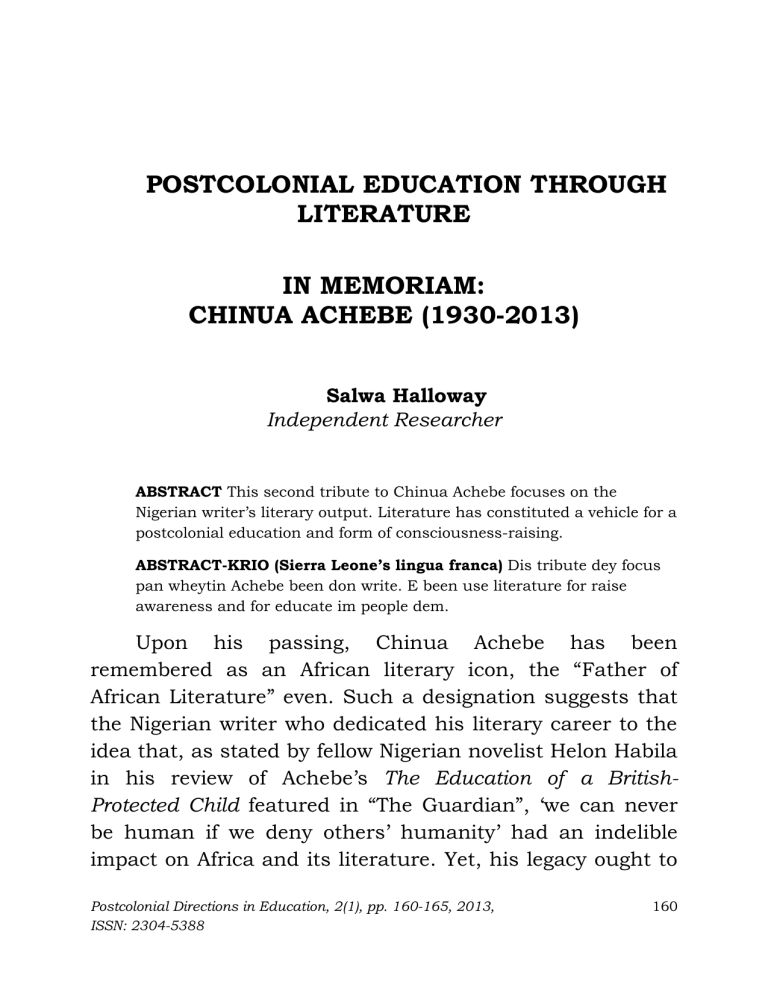
POSTCOLONIAL EDUCATION THROUGH
LITERATURE
IN MEMORIAM:
CHINUA ACHEBE (1930-2013)
Salwa Halloway
Independent Researcher
ABSTRACT This second tribute to Chinua Achebe focuses on the
Nigerian writer’s literary output. Literature has constituted a vehicle for a postcolonial education and form of consciousness-raising.
ABSTRACT-KRIO (Sierra Leone’s lingua franca) Dis tribute dey focus pan wheytin Achebe been don write. E been use literature for raise awareness and for educate im people dem.
Upon his passing, Chinua Achebe has been remembered as an African literary icon, the “Father of
African Literature” even. Such a designation suggests that the Nigerian writer who dedicated his literary career to the idea that, as stated by fellow Nigerian novelist Helon Habila in his review of Achebe’s The Education of a British-
Protected Child featured in “The Guardian”, ‘we can never be human if we deny others’ humanity’ had an indelible impact on Africa and its literature. Yet, his legacy ought to
Postcolonial Directions in Education, 2(1), pp. 160-165, 2013,
ISSN: 2304-5388
160
be extended beyond the realm of African literature. It would be correct to assert that his works spoke to African societies, urging them to reclaim their cultural sector from the tenacious grasp of the Western metropolises. And yes, he did promote self-knowledge as a means of combating the vacuum the colonial authorities had made out of African points of view and the despondency and loss of pride that accompanied this cultural destruction. However, a goal he seemed to be reaching for through writing is the leveling of the European-constructed cultural hierarchy that positions the West as the embodiment of normal experiences and
Africa as the exotic, at best. Achebe tells African stories not to define African literature as entirely unique, but to displace the monopoly of the Western literary canon over universality and to present his continent as inclusive of standard human experiences. For this reason, among others, he was more than just a great African writer. He was a great humanist.
By the time Achebe’s magnum opus Things Fall Apart was published in 1958, African nations were teeming with independence fervor. This entailed not only a demand for political and economic emancipation from the colonial administrations, but also the emergence of an African cultural renaissance that challenged the colonial discourse of Africa being devoid of any substantial culture. The new
African identities and subjectivities demonstrated an ideological contestation against colonial cultural policies and the social institutions that reinforced them. However,
Postcolonial Directions in Education, 2(1), pp. 160-165, 2013,
ISSN: 2304-5388
161
the acquaintance with the colonial culture had left populations of Africans, particularly educated ones, barred from returning to their traditional moorings. Within this group, one found a simultaneous representation and disavowal of the colonial authorities, as not only a compromise between the colonial subjects’ dual identities, but also a way of ousting the colonizer’s control over the colonized figure. Things Fall Apart embodies this struggle, as this novel is patterned along the lines of classical
European literature that laments the missionary interference with traditional Igbo society. Yet, through the protagonist Okonkwo, Achebe suggests that culture is transient and one must adapt to its caprice. Okonkwo’s suicide, though a demonstration of pride and an unwillingness to be dominated, neither benefits his community nor does it compl e ment traditional Igbo beliefs about death. In the novel, Achebe suggests that inflexibility is just as destructive as the absolute relinquishment of one’s traditional identity, a theme which he explores time and time again in his writings and speeches.
Even as a post-colonial writer whose texts are taught throughout African schools for the purpose of instilling continental pride in the youth, Achebe could not divorce himself from the colonial past. As previously mentioned, like many educated colonial subjects, his familiarity with the colonial culture rendered the pre-colonial identity a nostalgic fantasy. It produced a cultural limbo—a scenario in which one cannot belong wholly to an African or Western
Postcolonial Directions in Education, 2(1), pp. 160-165, 2013,
ISSN: 2304-5388
162
identity. A manifestation of this complex relationship is his production of anti-colonial texts in English, the language of
Nigeria’s colonizer. When addressing its usage in his speech ‘The African Writer and the English Language,’
Chinua Achebe declared that the abandonment of one’s native tongue and the usage of an imposed one when writing ‘looks like a dreadful betrayal and produces a guilty feeling. But for [him] there is no other choice. [He] has been given the language and [he intends] to use it.’ By writing in
English, he aligned himself with cultural colonialism—a point in which the Kenyan writer Ngugi Wa Thiong’o takes umbrage, insisting on Achebe’s support of this imposed language’s dominion over African literature. Yet his novels, which criticize the colonial experience, undermine the authority of the colonial powers. English was empowering, as it gave him a more global voice and, subsequently, a wider audience. It also reduced the instances of having his works translated and possibly having his message perverted as a result of the translation. In addition, this mélange of identities with which he operated, shows his determination to find a solution to the alienation of the former colonial subjects who could no longer fit into a distinct cultural identity. It is a testimony to his creativity.
Especially in his essays, Achebe lays bare Europe’s cultural hegemony as a position that was created in order to justify the domineering European presence in other parts of the world. He observed how the colonial structures interpellated the colonized and responded accordingly. As
Postcolonial Directions in Education, 2(1), pp. 160-165, 2013,
ISSN: 2304-5388
163
an African novelist, he took it upon himself to address the unique problems that menace the continent. Achebe identified the writer as the figure in society with keen sensitivities and an ability to detect injustices. Therefore, the African writer cannot be ignorant of the monumental abuse which Africans have been forced to endure.
Selflessly, Achebe found it his duty to re-write the story of
Africa, to include the injustices African faced from the
Western penetration of the continent, for, as he explains,
‘until the lions have their say, the stories of the hunt will always glorify the hunter.’
One must realize, though, that his intention was not to use literature to demonize Europe. Nor was he interested in a reversal of positions, which would place Africa as superior to the West. Instead, he attempted to erode the prejudices and negative connotations that had been fixed on Africa and, thus, bring the continent into universality.
Simply put, he wanted to reconfigure the politics of universality and truly make it a universal concept, as opposed to being reserved for a single, dominating group.
With regard to the function of the universal in literature, he delivered a speech for the Association for Commonwealth
Literature and Language Studies at Makare University in
Uganda stating that in the nature of things the work of a Western writer is automatically informed by universality. It is only others who must strain to achieve it […] I should like to see the word ‘universal’ banned
Postcolonial Directions in Education, 2(1), pp. 160-165, 2013,
ISSN: 2304-5388
164
altogether from discussions of African literature until such a time as people cease to use it as a synonym for the narrow, self-serving parochialism of Europe, until their horizon extends to include all the world.
Because of his interest in the universal, as exemplified by the above quote and even his mimicry of the colonial culture, his influence extends beyond African literature. If anything, he implies that despite the unique characteristics of the particular genre, African literature can be just as relatable as European literature has made itself to be. He presented African literature as human and not foreign.
His concern for African literature, his usage of words to empower a globally marginalized population, will remain his greatest legacy. Like writers of all genres of literature, he used his awareness of the world’s affairs to challenge the status quo. Though the flesh parts, his legacy will remain and give life to a new breed of writers who strive for universal justice.
Postcolonial Directions in Education, 2(1), pp. 160-165, 2013,
ISSN: 2304-5388
165

